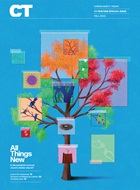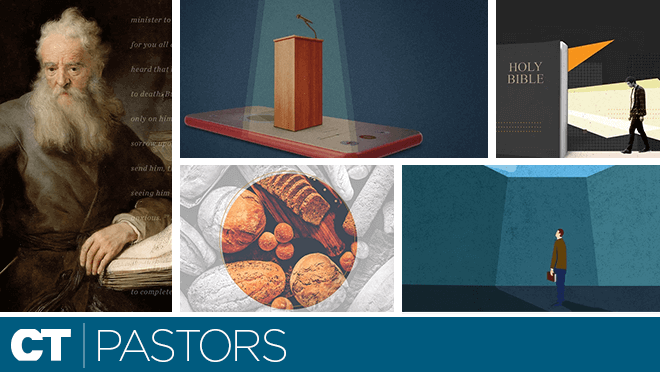For years I've heard church leaders say, "If we had more people attending and involved, more money to work with, and more space or facilities, then we would be able to do more." Like it or not, most of us face the reality of deciding how to live with less, and not more. But that doesn't have to mean we get less done or that we give less of our time, talent, or resources.
With great challenge comes great opportunity. Now is the greatest time in recent history for the church to lead the way in rethinking the involvement of people, the management of money, and the use of facilities.
Bottom-Line Responsibility
There is a term in the business community called the "triple bottom line"—;a phrase coined by John Elkington in 1994. It was later expanded and articulated in his 1997 book, Cannibals with Forks: the Triple Bottom Line of 21st Century Business. Triple bottom line (TBL) represents a balanced approach toward creating a sustainable business.
The concept of TBL demands that a company's responsibility be to "stakeholders" rather than shareholders. In this case, a stakeholder is anyone who is influenced, either directly or indirectly, by the actions of the firm. According to the stakeholder theory, the business entity should be used as a vehicle for coordinating stakeholder interests, instead of maximizing shareholder (owner) profit.
Let me restate that in church lingo for you: The concept of TBL demands that a church's responsibility be to people rather than to the church organization. In this case, "people" refers to anyone who is influenced, either directly or indirectly, by the actions of the local church. According to the stakeholder theory, the local church entity should be used as a vehicle for coordinating kingdom interests, instead of maximizing local church profit.
The church has within it the greatest resources on the planet: people with purpose, prime real estate with useable facilities, and the richest Father ever! So how can the church create a sustainable community in reference to the triple bottom line?
Eternal R.O.I.
Sustainability means operating a business in a way that acknowledges the needs and interests of other parties (community groups, educational and religious institutions, the workforce, the public) and that reinforces, rather than frays, the network of relationships tying them all together. Of course it's true that churches could get more done if they had more people attending and involved. But don't underestimate the power of leverage and synergy, especially among those who share the ultimate competitive advantage: people are God's and the church's number one resource.
Sustainability means operating a business or ministry so as to grow and create a positive return on investment (ROI). Church leaders complain about the lack of finances. It's time we as church leaders rethink where our money is going and what kind of return we are getting on the investments we are making.
In many ways, pastors and church leaders are tithe-and-offering "brokers"—;people who have been given the responsibility to provide investors with the maximum ROI, a return that is internal, external, but most of all eternal. Economic growth and financial success are important and provide significant benefits to individuals and society as a whole. But other human values are also important, including family life, intellectual growth, artistic expression, and moral and spiritual development.
Finally, sustainability means using the earth, the buildings, and the tools that God has provided for us to accomplish His work. Church leaders often wish they had bigger or different facilities. Can I let you in on a little secret? Above all things, this generation is looking for a church that leverages every aspect of the planet they've been given: the piece of real estate, the building on that piece of land, the facilities that make up that building. In every way, it's time that we maximize the use of our facilities.
God is coming back for a (literally) dirty church. Do you have your carpet guy on speed dial? If not, maybe you should. This is about being environmentally conscious, socially responsible, and amazing stewards of the talent (that is, facilities) that God has provided for us. This may require innovation.
Innovation doesn't dry up during an economic crisis; in fact, the opposite is true. During this time, more than ever, the church should be leading the way with innovation, creating culture, and showing the amazing love, grace, and power of the God we profess. For churches and main street businesses alike, the opportunity and the responsibility to create have never been greater.
Leveraged Assets
Opportunity and responsibility lie in the church finding its sweet spot and taking initiative. To find the sweet spot, identify the scarcity in your community, the unique passion of your leadership, and the gifts given to your church body. It's in that sweet spot that you will find a niche, a need, and a knack for getting more done with less because you're operating from God's Economic Stimulus Plan and not yours or Uncle Sam's.
Every local church includes people whom God has gifted as entrepreneurs, and they can help the church recognize a need in the community, a niche in the market, and a plan to leverage the church's most valuable, tangible assets (people, money, facilities) to create intangible and eternal results.
One of the church's greatest assets, and one that must be leveraged, is real estate: the amount of space available to the church and the location of that space. This asset allows churches to develop cafés and lounges without the struggle of paying monthly rent, an advantage main-street retail establishments do not have. A church is already paying for the real estate whether it chooses to operate a business within it or not. It's time to redefine "multipurpose" so that it encompasses more than a gym-turned-sanctuary-turned-gym.
Churches should consider the ROI that any ministry or business venture might yield. In addition to a return on investment, think also about a Relationship on Investment. We must recognize and use the tools that we have been given in order to maximize ROI and lead the way by engaging people, the planet, and even profits that are used to ultimately further the Kingdom of Heaven.
When a church considers a business, I believe it is important to ask, "Will this place connect people, develop leaders, and fund ministry causes both locally and globally?" It is then that the church is being the church: connecting people to one another and to God, helping develop leaders through the discovery and living out of their God-designed purpose, and tapping into the wisdom of God for innovative ideas that will give the church the opportunity to lead the way.
Innovation is needed now. Will the church lie down and watch this pass by, or will the church lead the way into future? Let's choose to lead.
Michael Trent is the founder and idea engineer of Third Place Consulting (ThirdPlaceConsulting.com) and a knowledge partner with the Cornerstone Knowledge Network (TheCKN.com).
Copyright © 2009 by the author or Christianity Today/Your Church magazine.
Click here for reprint information on Your Church.

Support Our Work
Subscribe to CT for less than $4.25/month

























